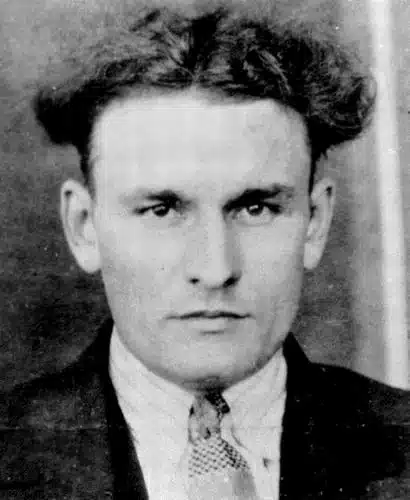Books and ballads have been written about a legendary outlaw whose first arrest was in Lucedale. Kinnie Wagner landed in the George County jail in October 1924 on a theft charge.
The late Ellis Ray Lee, who lived in Shipman, told me in a 1998 interview that Wagner stayed with his family one night in November 1924 when Lee was a young boy. It was a night when the infamous Wagner sought refuge from law enforcement officers. Wagner took the alias “Edward Forshaw,” but Lee’s father knew the outlaw’s real identity. However, he kept it from the family until Wagner was long gone. It happened at the old Lee homeplace on Agricola/Latonia Road in southeastern George County.
It was a cold night, and Wagner was offered shelter either inside the house or inside the barn. He refused both saying he didn’t like to be confined. Instead, he asked if he could sleep in the field of burning stumps that the Lee family had been tending that day while clearing the land for cropping. The next morning, Wagner ate breakfast with the family, and Lee’s mother packed him a lunch of sweet potatoes and bacon. Wagner told them he was Florida bound, but may have said that as a decoy.
The described incident could have been November 11, 1924, the day Wagner escaped the Lucedale jail riding a horse backwards out of town. Although Wagner led a criminal life from Texas to Tennessee and eventually died in prison, many folks believe his life took a wrong turn after he was framed with a stolen watch in Lucedale, and they were glad to see him make the numerous getaways for which he is famous. Such sympathy toward Wagner explains why Lee’s father welcomed him into his home.
Wagner contended until his death in 1958 that he might have killed people, but that he never stole. He maintained he had been framed with the watch. He said a fellow headed to do a job that might risk the watch being broken had asked Wagner to safekeep it temporarily. At the time, Wagner was running moonshine, and Federal Bureau of Investigation agents were searching the area for clues to catch the primary culprit, who was allegedly a south Mississippi sheriff. Wagner claimed the sheriff hired him to transport the whiskey and then framed him with the watch theft to quiet him.
A Virginia native born in 1903, Wagner ran away with the circus as a teenager. He joined the Richard Brothers’ Circus, a one-ring show featuring wild animals and bronco-riding cowboys. The circus set up in communities across the South, and one of those places was Leakesville.
Wagner was a sharp-shooter and could shoot from the hip without aiming. He later became known as The Two-gun Desperado as his aim was successful whether shooting with his left hand or his right. It is no surprise he could shoot his way out of ambushes when running from the law. He was also a ladies’ man and a likeable fellow to other fellows; so, it is no surprise he found favor when looking for hide-outs. Wagner had a knack for training animals and could ride horses frontwards, backwards and underneath their bellies; so, it is no surprise he rode the get-away horse out of Lucedale sitting on it backwards and laughing all the way. His gift with animals also led him to train guard dogs at the Mississippi State Penitentiary at Parchman during his time there. In doing so, Wagner trained the dogs not to hunt him. Wagner convinced guards to allow him to hunt other escapees, and on at least two occasions he escaped during those hunts knowing the dogs would not trail him.
He was a circus star, sharpshooter, bootlegger and convicted felon who killed five people and escaped jail four times. He died of a heart attack at Parchman in 1958 while playing with puppies of one of the guard dogs he tended. His body was returned to his hometown in Virginia’s Clinch Mountains, and his funeral service drew 15,000 visitors.
His tombstone in the Mountain View School Cemetery in Gate City, Va. simply states “W. Kinnie Wagner 1903-1958.” Only a dash exists between his birth date and his death date, but if the dash could talk, without a doubt some tales would be told.




